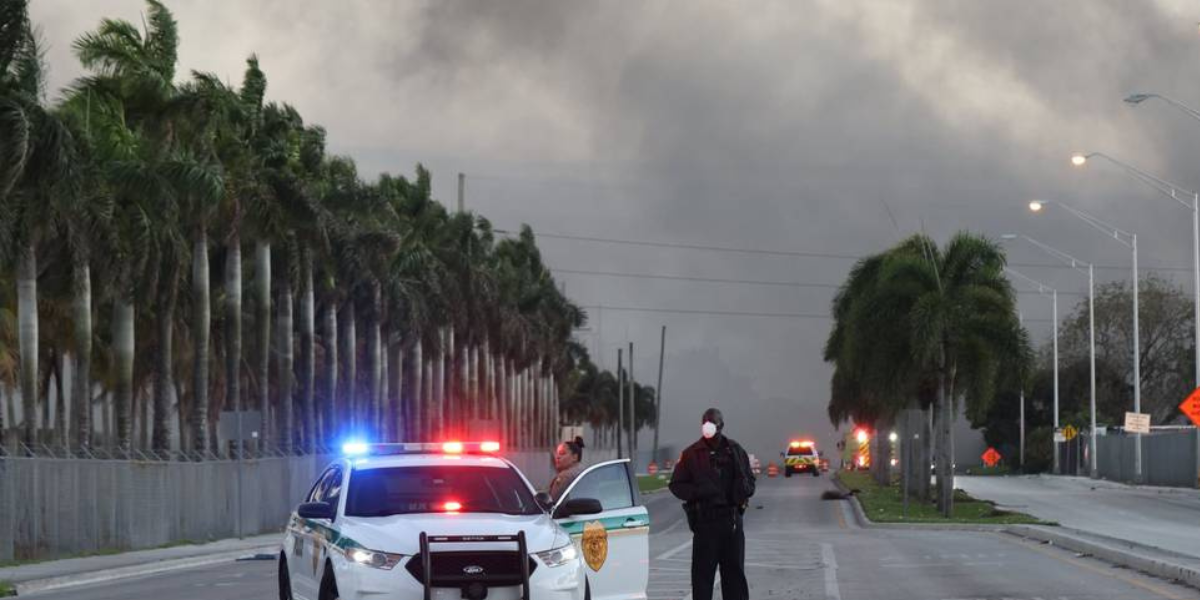A new report indicates that Doral residents have endured dangerous conditions during the three-week Covanta waste incinerator fire.
doral-fire.jpg
Doral fire
CBS NEWS MIAMI
A new in-depth report by environmental law nonprofit Earthjustice and grassroots group Florida Rising detailed the air pollution and public health and safety hazards residents faced from the massive fire that burned at the Covanta Energy waster incinerator back in February. The report found “dangerous concentrations” of toxic pollutants and chemical contaminants at the facility and across Doral as the fire burned for almost three weeks.
After analyzing official air quality reports from monitoring stations across the city, the report found concentrations of Particulate Matter 2.5 — a toxic air pollutant — at levels deemed “unhealthy” by the Environmental Protection Agency (EPA) as early as Feb. 14. Despite Miami-Dade County’s official statements that there was no air quality or environmental safety concerns from the fire, exposure to Particulate Matter 2.5 is linked to numerous health conditions, including asthma, decreased lung and organ function, and irregular heartbeat, according to the report.
Concentrations of volatile organic compounds, chlorine, carbon monoxide, and hydrogen cyanide were also detected in the air at levels the EPA classifies as “unsafe” for humans, the report stated.
“No community should have to endure the nightmare that Doral residents went through,” stated Sebastian Caicedo, Miami Regional Director of Florida Rising.
After assessing records from Miami-Dade County’s Department of Environmental Resources Management (DERM), the report also found water quality issues at the site during the fire and asbestos contamination in the walls and roof of the incinerator facility that was demolished, with asbestos-containing materials taken to the nearby Medley Landfill.
doral-trash-fire-2-21-23.jpg
Fire at county waste collection site in Doral
CBS NEWS MIAMI
“It will take a long time before the public health effects of this disaster are fully realized, but this report makes one thing immediately clear: trash incineration is not clean, safe, or sustainable, contrary to what industry would want us to believe,” Caicedo added.
The report also found that there have been four other fires at Covanta’s Doral facility in the past four years. Before the February fire, Florida’s Department of Environmental Protection warned Miami-Dade County of potential violations at the facility that included fire safety hazards, the report stated.
Photos and video of the plumes of black smoke engulfing the community went viral across social media, along with the renewed outrage that not only the 40-year-old incinerator was still in operation but that Miami-Dade County has not definitively ruled out building a new incinerator in Doral or elsewhere.
Covanta fire scene
A fire at a Doral recyclable energy plant sent a huge plume of black smoke into the air Sunday afternoon.
CBS 4
Last year, Florida Rising documented in a civil rights complaint to the EPA that Florida’s municipal trash incinerators disproportionately harm communities of color and communities where they have limited English-speaking skills. Florida Rising and Earthjustice join other environmental and public health advocates, demanding that Miami-Dade Mayor Daniella Levine Cava remove waste incineration funding from the county’s Zero Waste and Climate Action plans.
“We welcome the chance to provide public input into a true Zero Waste plan for Miami-Dade County,” Caicedo stated.
“Miami-Dade has a historic opportunity to be a leader in our state in reducing harmful emissions, improving public health, and strengthening racial equity through the County’s Zero Waste Action Plan,” added Dominique Burkhardt, Earthjustice Senior Attorney and the report’s lead author.
“Rather than focusing on an industry of the past, Miami-Dade should be prioritizing true Zero Waste solutions like waste reduction, composting, and recycling, instead of propping up an industry that will lead to dirtier air and increased sickness.”
Source: https://www.cbsnews.com/







